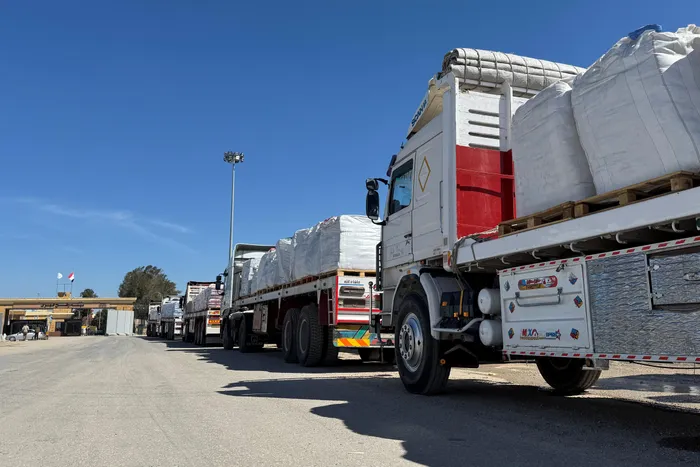BRICS+ Series: Egypt's Closed Rafah Crossing

Trucks carrying humanitarian aid line up on the Egyptian side of the Rafah border crossing with the Gaza Strip on March 2, 2025, after Israel suspended the entry of supplies into the Palestinian enclave. Israel said on March 2, that it was suspending the entry of supplies into Gaza, with artillery fire and an air strike reported in the territory after it and Hamas hit an impasse over how to proceed with their fragile ceasefire.
Image: (Photo by AFP)
Historical Context: Egypt’s Peace with Israel
The 1979 peace treaty between Egypt and Israel was met with strong condemnation from the Arab League, resulting in Egypt's expulsion and potentially contributing to the assassination of President Sadat. This Treaty, reached after decades of conflict, was seen as a betrayal by other Arab states due to its violation of the Arab League's 1967 Khartoum Resolution, which explicitly prohibited negotiations with Israel.
Israel has escalated its aggression against Palestine since October 2023, resulting in numerous international crimes and tens of thousands of Palestinian deaths- many of them women and children, including the bombing of so-called ‘safe zones’ for Palestinians. The situation in Gaza, with its large young population, has been described as the world's largest open-air prison.
Escalation in Gaza: A Humanitarian Emergency
The phrase never again, often used in reference to historical atrocities, appears to be applied selectively. The situation in Palestine echoes the horrors of Nazi Germany; innocent Palestinians are subjected to similar propaganda and dehumanising language. Israeli leaders and soldiers have referred to Palestinians as human animals, threatened to turn Gaza into a "slaughterhouse," and vowed to "erase the Gaza Strip from the face of the earth." These statements have been cited as evidence in South Africa's case against Israel at the International Court of Justice, accusing Israel of genocide. This selective condemnation highlights the hypocrisy surrounding the use of such language; it is only condemned for a select few or when it's too late.
Israel's strategy involves misleading Palestinians about safe zones, only to attack those areas later. This forces Palestinians to flee to the Rafah border, their only remaining option. Despite being a shared entry point between Egypt and Gaza, Israel controls the Rafah border, undermining Palestinian sovereignty.
In May 2024, Israel's military urged Palestinians to evacuate to Rafah, which they falsely claimed was safe. Consequently, over a million people gathered there. The Rafah Crossing is a humanitarian corridor vital for aid and medical evacuations, was recently retaken by Israeli forces, who raised their flag, symbolising their control.
Rafah Crossing Under Siege
On 9 April 2025, thousands of Egyptians gathered at the Rafah border in protest, demanding that humanitarian aid be allowed into Gaza. The demonstration—one of the largest in recent memory—reflects growing frustration among Egyptians over their government’s stance. Protesters called for immediate access to food, medicine, and essential supplies for Palestinians, while criticising both Israeli aggression and Egypt’s prolonged closure of the crossing. The pressure from within Egypt adds urgency to an already volatile crisis and highlights the internal political cost of inaction.
Mounting Public Pressure in Egypt
While a final ruling is expected to take years, the ICJ has issued several legally binding provisional measures. In January 2024, the court found it plausible that Palestinian rights under the Genocide Convention were being violated and ordered Israel to take all measures to prevent acts of genocide, including preventing incitement and ensuring humanitarian assistance. Subsequent orders reaffirmed these measures and specifically instructed Israel to ensure the unhindered provision of aid and to immediately halt its military offensive in Rafah, emphasising the worsening humanitarian crisis. While not mandating a full ceasefire across Gaza, these ICJ rulings represent a significant step in holding Israel accountable under international humanitarian law.
The mid-January 2025 ceasefire between Israel and Palestinian factions collapsed by mid-March 2025. Subsequent attempts to reinstate the ceasefire have been unsuccessful, leading to a resurgence of violence in Gaza and an increase in civilian casualties.
The main agenda in the Israeli military occupation of the Rafah Crossing is to force Palestinians out, leaving the land open for Israeli occupation to continue. The behaviour of Israeli forces questions the validity of current mediation talks between Israel and Hamas, especially considering that Egypt is a key player in the negotiations.
Egypt’s Global Shift: From Mediator to BRICS Member
Egypt’s stance on the Gaza crisis is no longer just regional—it now carries global weight. Since joining BRICS in January 2024, Egypt has stepped into a broader diplomatic role, aligning with countries pushing for a more multipolar world order. As the only BRICS member bordering Gaza, its decisions at the Egypt Rafah crossing are under close watch—not just by neighboring states, but also by fellow BRICS nations advocating for humanitarian access and justice. Egypt's next moves could shape both the regional response and its growing influence on the global stage.
Written By:
*Dr Iqbal Survé
Past chairman of the BRICS Business Council and co-chairman of the BRICS Media Forum and the BRNN
*Banthati Sekwala
Associate at BRICS+ Consulting Group
Egyptian & South African Specialist
**The Views expressed do not necessarily reflect the views of Independent Media or IOL.